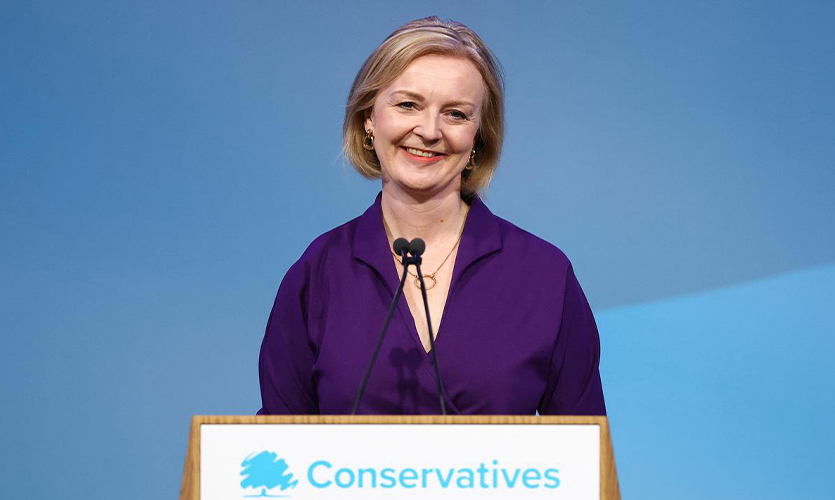On September 5, British foreign minister Liz Truss emerged victorious against the former chancellor of Indian descent, Rishi Sunak, in the race for the Conservative Party’s leadership. Truss will formally take over as the prime minister of the United Kingdom today, replacing the controversial Boris Johnson administration. Liz Truss won the election with 81,326 votes, against the 60,399 received by Rishi Sunak.
An estimated 160,000 Tory members cast ballots online and by mail, and it was widely anticipated that the 47-year-old senior cabinet minister would win. Truss ended Sunak’s historic campaign as the first British Parliament member of Indian descent to run for the top position at 10 Downing Street. She will be the third female prime minister of the United Kingdom, after Theresa May and Margaret Thatcher.
At a ceremony near Downing Street, the result of the Conservative Party leadership contest was formally announced by Sir Graham Brady, returning officer and chair of the 1922 Committee of backbench Conservative MPs.
For pollsters, political analysts and media outlets, the result came as little surprise given pre-poll survey trends and bookmaker odds on the race. A combination of the Tory membership base’s lingering loyalty towards outgoing prime minister Boris Johnson, who they believe was betrayed by former close ally Sunak, and Truss’ pledge to cut taxes, seems to be the key factor behind the British-Indian MP failing to clinch the race.
While the over 1.5-million-strong Indian diaspora stood firmly behind the UK-born MP for Richmond in Yorkshire, other sections of the Conservative Party, including those who trace their roots to other parts of the sub-continent, were expected to be more divided.
In an effort to address the nation’s cost-of-living issue, Truss promised during her campaign to undo Sunak’s tax increase proposals while he was Chancellor. This commitment appears to have paid off. While audiences at nearly a dozen party hustings responded well to Sunak’s strategy of wanting to concentrate on combating rising inflation and utilising targeted measures to help those who are most in need, it is evident that this was insufficient to tip the scales in his favour.
Truss, who has been chosen party leader, won’t be able to officially claim her new post at 10 Downing Street until Tuesday afternoon, after Johnson submits his formal resignation to the monarch at Balmoral Castle in Scotland. Soon after, Truss will meet with the 96-year-old Queen Elizabeth II for the first time as Prime Minister-elect, before being flown back to London to take oath and introduce her new cabinet.
Truss’ Political Career
During the general election of 2010, Truss won the South West Norfolk district. As a backbencher, she pushed for reform in a variety of policy areas such as childcare, mathematics teaching, and the economy. Britannia Unchained and After The Coalition are two books she has co-authored. She also founded the Free Enterprise Group of Conservative MPs in 2011.
Truss served as the Parliamentary Under-Secretary of State for Childcare and Education from 2012 to 2014, before being selected by David Cameron as the Secretary of State for Environment, Food, and Rural Affairs during the 2014 cabinet reshuffle. During the 2016 vote, she supported the ‘Britain Stronger in Europe’ campaign, which supported the UK’s continuing membership in the EU, although eventually supporting Brexit. When Truss was appointed Secretary of State for Justice and Lord Chancellor by Theresa May, after Cameron’s departure in July 2016, she became the first female Lord Chancellor in the 1,000-year history of the office.
After the 2017 presidential election, Truss was selected to hold the position of chief secretary for the Treasury. When May announced her departure in 2019, Truss supported Johnson’s desire to head the Conservatives. He appointed her to the posts of Secretary of State for International Trade, and President of the Board of Trade.
She added the title of Minister for Women and Equalities to her résumé in September 2019. In the 2021 cabinet shuffle, Johnson awarded her a promotion to Foreign Secretary. She was appointed the government’s chief negotiator between the EU and UK head of the EU-UK Partnership Council in December 2021.
Truss’ Cabinet
It is anticipated that the major ministerial portfolio announcements will begin to flood in by Tuesday night. One of the four major positions of power will be held by a person of colour for the first time in British history. The Guardian reports that Liz Truss plans to name Kwasi Kwarteng as Chancellor, Suella Braverman as Home Secretary, and James Cleverly as Foreign Secretary.
Boris Johnson’s former advisor Samuel Kasumu who quit last year following a contentious report by the Commission on Race and Ethnic Disparities, which some criticised for dismissing structural racism, praised the anticipated appointments, as reported by the Guardian.
It further stated that her rival, Rishi Sunak, is not anticipated to be given a position in her government, breaking with the custom in which most defeated leadership hopefuls have traditionally been given positions.
On Tuesday, at 12:10 pm local time, Liz Truss is anticipated to arrive at Balmoral Castle in Scotland, where she will formally be named the nation’s new prime minister by Queen Elizabeth II.
According to Reuters, Boris Johnson’s government lost support after several months of scandals, and ministers resigned to drive him out. As a result, he was obliged to announce his resignation in July. The agency stated that Johnson will deliver a statement in front of 10 Downing Street before travelling to Scotland to visit the monarch at her Balmoral estate and formally tendering his resignation.
Read more: No UK Prime Minister Has Performed Worse Than Boris Johnson: Ipsos Survey










